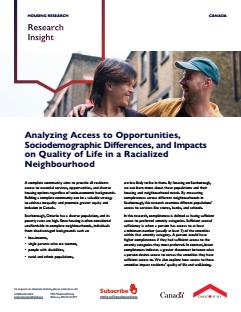This research examines how complete communities can ensure fair access to essential services and diverse housing options for everyone – regardless of socio-economic status. It focuses on Scarborough and defines and explores neighbourhood completeness by measuring access to services like healthcare, transit, grocery stores and schools.
The research team from the Suburban Mobilities Cluster at the University of Toronto Scarborough used a literature review, surveys, a multi-modal analysis and focus groups to:
- determine the features of a complete neighbourhood
- measure resident satisfaction, including identifying the amenities and services that are important to them as well as the potential negative impacts of complete neighbourhoods
- evaluate how neighbourhood completeness affects residents’ quality of life and well-being
The research shows that neighbourhood completeness means different things to different people. It also highlights barriers for disadvantaged, diverse and lower-income populations in accessing complete neighbourhoods, with affordability being a significant challenge. The study provides ideas for future research opportunities to explore the links between complete communities and quality of life.
- Author:
- CMHC
- Document Type:
- Date Published:
- October 8, 2024







 Share via Email
Share via Email
